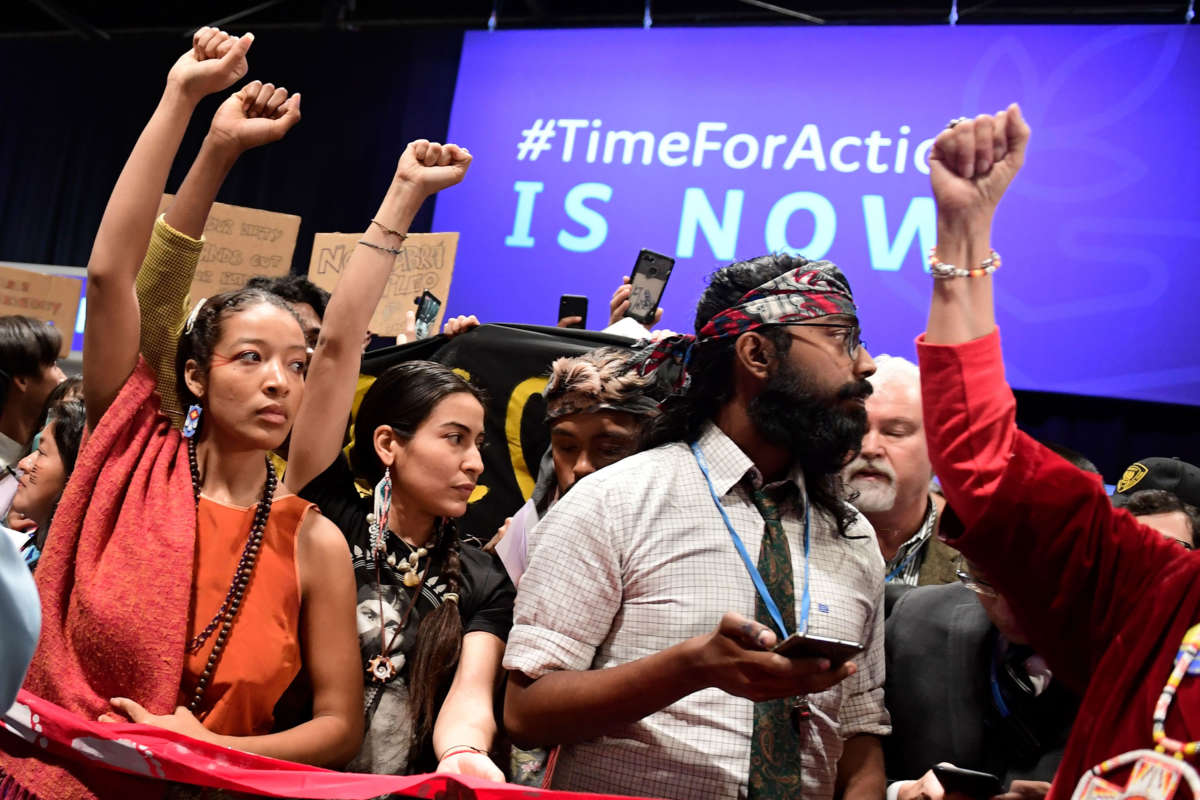Truthout is an indispensable resource for activists, movement leaders and workers everywhere. Please make this work possible with a quick donation.
Big polluters are to blame for slow progress in the annual UN climate negotiations in Madrid, Spain, according to activists — with several companies sponsoring the talks in exchange for tax breaks.
Sponsors of the talks, known as COP25, include the electrical utilities company Iberdrola, which produced 24.6 million tonnes of carbon dioxide emissions in 2018, and Endesa, which through its operations produced 61.9 million tonnes of carbon dioxide equivalent, according to analysis.
Nonetheless, representatives from major oil and gas companies have been invited to speak on panels taking place throughout the meeting.
“Everything in this hall smells bad. It smells of coal, it smells of oil, it smells of gas. This is because we have, in these spaces, the same transnational corporations that are polluting the world and leading us to extinction. And they are pushing their agendas,” says Nathalie Rengifo-Alvarez of NGO Corporate Accountability, one of the groups that produced the analysis of the corporate sponsors of the conference.
To attend the climate conference, delegates must be accredited by the UN’s climate organisation, known as the UNFCCC. But some activists have argued that instead of being approved and invited into the negotiations, polluting corporations should be barred from the proceedings, given their financial interests in the continuing extraction of fossil fuels.
“Inside the talks, trade associations representing the interests of the fossil fuel industry and other Big Polluters stalk the halls and push their members’ agenda. The result of this corporate omnipresence is clear — the negotiations move at a snail’s pace and more often than not reflect the interests of global corporations, not people and the planet,” wrote campaigners against corporate influence on the website Common Dreams, as the negotiations kicked off last week.
Polluting Panels
On Tuesday, a Shell representative took part in a panel organised by the International Emissions Trading Association (known as IETA, a pro-carbon market business lobby whose members include BP, Chevron, Shell and TransCanada). David Hone, Shell’s chief climate change advisor, took to the stage to advocate for carbon pricing and carbon capture and storage (CCS).
Pascoe Sabido of campaign group Corporate Europe Observatory (CEO) called Hone’s appearance a “huge conflict of interest.”
CEO is concerned the industry is using the promise of carbon capture and storage technology as an excuse to avoid directly reducing emissions by promising to bury them instead of transitioning away from fossil fuels altogether.
“Shell is a multibillion pound corporation and has a responsibility to its shareholders, and it needs to keep showing it has reserves on its books and that it keeps turning a profit,” Sabido said.
Nor was the Shell panel a one-off event. According to Sabido, Shell has spoken at six events during this year’s conference, and sent 146 delegates to the UN climate talks over the past 20 years.
On Monday, the government of Australia hosted a joint reception alongside the Carbon Market Institute, whose members include BP, Shell and ConocoPhillips. The invitation-only event illustrates the extent to which energy companies have access to national governments in the UN policy-making process.
This access quickly turns into influence — at the negotiations last year, Hone boasted that Shell had helped to write some of the text that appears in the Paris Agreement, including controversial language around carbon markets.
Ignoring Communities
As well as offering access to the negotiations, activists argue that corporate sponsorship gives polluting companies an opportunity to unfairly clean up their images.
Indeed, for many activists, particularly in the global south, ending fossil fuel extraction is not only about fighting climate change, but also about supporting human rights — Shell, for instance, has been accused of human rights abuses and environmental destruction in Nigeria.
“Time and again, corporations ignore communities and the lands that they feed from. They extract resources and use their profits to oil their way into negotiations like COP and use their greenwashing to try and position themselves as acceptable,” says Vidya Dikar with Asian Peoples’ Movement on Debt and Development in a statement.
Last week, activists walked out of a panel event featuring Shell, BP and Chevron.
More broadly, the solution is not for activists to walk away from the talks, and instead to try and ensure that polluters cannot influence the process, says Brandon Wu, director of policy and campaigns at ActionAid USA, speaking in Madrid on Tuesday.
“This process is essential because climate change is a global problem that requires a global solution,” he said. The problem is that the negotiations are currently dominated by players without the best interests of the planet at heart — including corporations and the US government. “We just have to have different kinds of actors in this space. We can’t have corporations in this space.”
Press freedom is under attack
As Trump cracks down on political speech, independent media is increasingly necessary.
Truthout produces reporting you won’t see in the mainstream: journalism from the frontlines of global conflict, interviews with grassroots movement leaders, high-quality legal analysis and more.
Our work is possible thanks to reader support. Help Truthout catalyze change and social justice — make a tax-deductible monthly or one-time donation today.
